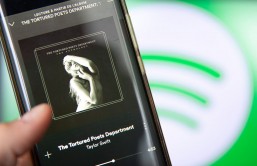
(Photo : REUTERS/Mary F. Calvert/File Photo)
FILE PHOTO: U.S. Senate Minority Leader Chuck Schumer (D-NY) makes a statement after meetings to wrap up work on coronavirus economic aid legislation, during the coronavirus disease (COVID-19) outbreak, in Washington, U.S., March 22, 2020.
A relief package bill which nears $500 billion has been passed in the United States Senate, Tuesday,
The said package includes hundred of billions allocated to fund small businesses which are highly affected by the restrictions imposed by the coronavirus outbreak. It also includes the budget for other priorities for hospitals, healthcare, and expanded COVID-19 testing.
The exact budget which has been allocated for the said bill is about $484 billion and is the latest unprecedented effort bu Washington to boost the economy after the $2 trillion stimulus packages, $8.3 billion plan the Congress approved, and the $192 billion relief measure. Democratic leaders are also already planning for another massive bill to aid in the fight against the pandemic.
A cope of the said legislative text which is 25 pages long was obtained by CNN, who reported that there was a section-by-section analysis showing that the said deal would authorize a Paycheck Protection Program with a allocated additional $310 billion.
The program has been set up to give help to small business which has been struggling with the economic freeze that has been triggered by the CVODI-19 pandemic. The funding for the program has run out earlier this month which prompted an outcry from the community of small businessmen.
Read also: Trump Says US Immigration Ban Would Last for 60 Days
Aside from this $310 billion PPP, the deal will also allocate $75 billion for healthcare providers and hospitals which has received the hardest hit of the pandemic. The said budget will also address the problem with coronavirus expenses and lost revenue. There is also an additional $25 billion which is allocated to facilitate and expand COVID-19 testing.
How the bill deals with COVID-19 testing
According to the analysis of the bill, the $25 billion amount for testing will be spent towards research expenses aiming to develop, validate, purchase, manufacture, administer and expand capacity of testing. Out of these, $11 billion will be given to localities in order for them to process and analyze tests. The rest will be given to other agencies including federal agencies and will be used to invest in promising new technologies and will be distributed to laboratories.
Moreover, the analysis also noted that the bill "requires (a) strategic plan to related to providing assistance to states for testing and increasing testing capacity." In addition, it also requires a plan for the states and municipalities on how the money will be spent on testing.
There has also been a dispute on how the COVID-19 testing which had earlier held up the said agreement. One major issue that has not been earlier resolved was whether to create a testing strategy on a national level.
Meanwhile, US President Donald Trump has already signaled his approval of the deal through a tweet and said that he is urging the Senate and House of Representatives to pass the Paycheck Protection Program and Health Care Enhancement Act.
I urge the Senate and House to pass the Paycheck Protection Program and Health Care Enhancement Act with additional funding for PPP, Hospitals, and Testing. After I sign this Bill, we will begin discussions on the next Legislative Initiative with fiscal relief.... — Donald J. Trump (@realDonaldTrump) April 21, 2020
He also indicated that the negotiators will deal with the additional fundings for both the state and local governments in the next legislative package aimed for the relief.
Related news: Trump Bans US Immigrations to Protect 22 Million Americans Who Lose Jobs








